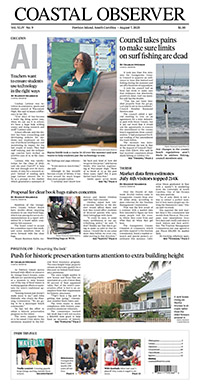Education
District considers restrictions on cellphones

Proposed state legislation to ban or limit cellphones in schools has prompted the Georgetown County School Board to review its own policy on electronic devices.
The district currently leaves cellphone policy to the discretion of each school principal.
“With elementary and middle schools, they don’t need to have it in the classroom. Period,” Board Member Lynne Ford said.
She believes high school students should be granted some leniency.
The main issue, to Ford, is creating a consistent policy for all schools.
“In some areas, it’s kind of relaxed, and in some areas, it might be strict,” Ford said. “It’s really hard to put that on teachers to make them police cellphone usage and they’re trying to teach the class.”
A bill introduced in the state Senate this year would have have required all public schools to adopt a policy outlining the use of cellphones in the classroom for both students and employees.
The bill, which was sent to committee, would prohibit cellphone use during classroom instruction, which must be included in the district’s written student code of conduct.
A ban on cellphones in classes at Waccamaw Middle School implemented two years ago had a significant impact on raising the school’s overall rating on the state report cards to “excellent” this year, Ginny Haynes, the principal, told the school board this week.
Cheating, disruption and bullying were the major points of reason for the ban.
Haynes invited the school board members to stop by recess some day to see the effect of the ban.
Interpersonal communication between students is most important to Board Member Scott DuBose.
“They’re reading, they’re truly interacting more,” DuBose said. “Social skills are improving, behavior is better.”
The district already has a policy regarding “electronic devices” in school. It dates from an era when pagers were seen as a threat.
The code lists the possession of an unauthorized device as a level one offense punishable by a detention or suspension.
A dress code violation is also a level one offense.
A cell phone ban wouldn’t affect Hollis Grafe, a rising senior at Waccamaw High, much because she is rarely on her phone.
“Sometimes when we don’t have anything to do in our classes, what else are we supposed to do?” she said.
At Waccamaw Middle, the policy says phones, bluetooth headphones and similar devices must be left in their lockers during the school day. Those that aren’t will be confiscated.
Ellison McLeod, a rising senior at Waccamaw High, feels secure with her cellphone on her at all times.
“We kind of have a right during lunch to have our own freedom and be on our phone. I just don’t think they can take away our private property,” McLeod said. “And are they going to take my watch too?”
A bill introduced this year in the state House also took aim at updating school cellphone policies. Initially, the bill aimed to redefine the section to address “wireless electronic communication devices” instead of “paging devices.”
The House bill defined these devices to include a “telephone, personal digital assistant, paging device, text‑messaging device, watch, any other device similar in function that can be used to wirelessly communicate with another person or a device used to listen to such wireless communication devices.”
The bill was also sent to committee. School board members are concerned that the proposed legislation would force them to act or lose state funding.
Scarlett Van Bloem, a rising Waccamaw High senior, frequently creates art during school. A cellphone ban would affect her creative process as she uses it for reference photos and to share images of her art, she said.
A solution to the distraction may not be effective to Van Bloem.
“So many people rely on their cellphones that if you suddenly take that away, that might cause other issues,” she said.
Contacting parents was a major issue to Mary Moore, another rising senior. Although Moore believes cell phones are distracting, many teachers at Waccamaw High have implemented lock boxes outside classrooms for student phones.
Moore said a classroom policy is understandable, but a premise policy would draw the line.
“Not having it in a class is one thing,” Moore said. “In general, a lot of people might leave for lunch or if you’re feeling sick and you need to text your mom.”
Waccamaw Middle’s parents and students have received the ban well, according to Haynes. She said that was accomplished by having a transparent policy.
Ford said she thinks the benefits will extend beyond school.
“I think it’s going to be better for their mental health overall. I think it will even spill over a little at home,” she said.
Board Member Patti Hammel believes cellphones should be banned during instructional periods. Speaking as a grandmother, she believes a simple text can make a world’s difference in an emergency situation.
“I would not want my grandchild to not have access to be able to let me know he or she is OK,” Hammel said.




